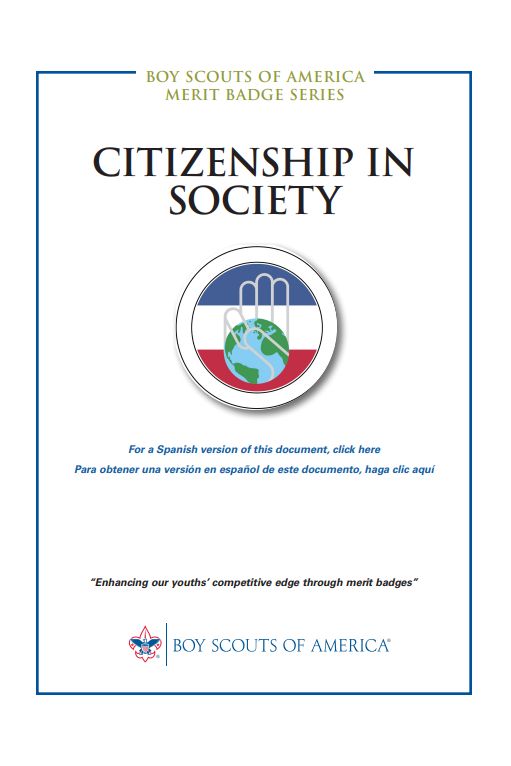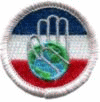This Merit Badge is Required
to earn the Eagle Scout Rank
Overview for Counselors
The Citizenship in Society Merit Badge is unique, in that there is no merit badge pamphlet. The requirements and instructions for Scouts and Counselors which are available at http://filestore.scouting.org/filestore/merit_badge_reqandres/CitizenshipSociety_Counselors.pdf should be reviewed before agreeing to serve as a counselor.
Furthermore, counselors for the badge are strongly encouraged to complete the DEI volunteer training, which includes integral information on key concepts the Scouts will be studying, at https://training.scouting.org/courses/SCO_1800
In addition, review of the counselor facilitation guide is necessary as it includes important information to aid in your research and preparation: https://filestore.scouting.org/filestore/diversity_equity_and_ inclusion/Citizenship-in-Society-Merit-Badge-Counselor-Guide-2021.pdf (Note: While the link indicates the guide is the 2021 version, clicking on the link will download a current version (Updated in JUNE 2022).
Overview for Scouts
The focus of the Citizenship in Society merit badge is to provide you with information on diversity, equity, inclusion, and ethical leadership. You’ll learn why these qualities are important in society and in Scouting, as well as how to help other people at all times and serve as a leader and an upstander. The Boy Scouts of America continues to be committed to developing a culture in which every youth, volunteer, and employee feels included and welcomed - and to building communities where every person feels respected and valued.
- We welcome families and individuals of all backgrounds and identities to help prepare young people to serve as successful members and leaders of our nation's increasingly diverse communities.
- We are committed to creating inclusive environments and promoting a culture of respect and belonging for all.
- We expect all members to be guided by the Scout Oath and Scout Law.
- As found in the definition of "reverent" in the Scout Law, we expect our Scouts to "respect the beliefs of others," both within and outside of Scouting.
- We want everyone who follows the values of the Scout Oath and Scout Law to feel welcomed and able to take advantage of the many opportunities Scouting provides, and we want every Scout to feel a sense of acceptance and inclusion in their unit and in Scouting.
- We expect and appreciate that our Scouts do their best to make all
feel welcomed.
- Learning about and understanding different identities and abilities will help each Scout understand what to do to help make other Scouts feel welcomed and find a sense of belonging in Scouting.
Instructions for Scouts
By now in your journey as a Scout, you have probably completed other merit badges and become familiar with using the merit badge pamphlet that usually accompanies the. The process of earning this merit badge will be different, as it intentionally places the responsibility of research and identification of resources on you instead of using a merit badge pamphlet.
- You are encouraged to explore as deeply and broadly as you see fit for your personal learning and growth.
- Your merit badge counselor may, for certain requirements, ask you to identify your sources.
- Your counselor will not be providing you with answers or resources, but will be engaging you in conversation to ask about what you have learned and how you plan to apply your new knowledge to your life as a Scout and as a good citizen in society.
- As you undertake these learnings, think about how you can demonstrate the values of the Scout Oath and Scout Law in your daily life.
Requirements
"Discussion" requirements will be either with a counselor and another individual (in accordance with Youth Protection Guidelines (https://www.scouting.org/health-and-safety/gss/gss01), or with your counselor and a small group (of Scouts), depending upon your preference.
- Before beginning work on other requirements for this merit badge:
- Research the following terms, and then explain to your merit
badge counselor how you feel they relate to the Scout Oath and Scout
Law:
- Identities
- Diversity
- Equity
- Equality
- Inclusion
- Discrimination
- Ethical Leadership
- Upstander
- Research the following terms, and then explain to your merit
badge counselor how you feel they relate to the Scout Oath and Scout
Law:
- Document and discuss with your counselor what leadership means to
you. Share what it means to make ethical decisions. Explain what decision
and/or options that leader had, why you believe they chose their final
course of action, and the outcome of that action.
- Research and share with your counselor an individual you feel has demonstrated positive leadership while having to make an ethical decision. (It could be someone in history, a family member, a teacher, a coach, a counselor, a clergy member, a Scoutmaster, etc.)
- Explain what decision and/or options that leader had, why you believe they chose their final course of action, and the outcome of that action.
- Consider ethical decision-making.
- Think about a time you faced an ethical decision.
- Discuss the situation, what you did, and how it made you feel.
- Share if you would do anything differently in the future and if so, what that would be.
- List three examples of ethical decisions you might have to make
in the future at school, at home, in the workplace, or in your community,
and what you would do.
- Share how your actions represent alignment with the Scout Oath and Scout Law
- Explain to your counselor how you plan to use what you have learned to assist you when that time comes, and what action(s) you can take to serve as an upstander and help other people at all times.
- Think about a time you faced an ethical decision.
- Repeat the Scout Oath and Scout Law for your counselor. Choose two
of the three following scenarios and discuss what you could do as a
Scout to demonstrate leadership and your understanding of what it means
to help others who may seem different from you:
- Scenario 1: While at camp, a youth accidentally spills food on another camper. The camper who gets spilled on gets angry and says something that is offensive to people with disabilities; their friends laugh. What could/ should you do?
- Scenario 2: Your friend confides in you that some students in school are making insulting comments about one of their identities, and that those same students created a fake social media account to impersonate your friend online and post messages. What could/should you do?
- Scenario 3: A new student in your class was born in another country (or has a parent who was born in another country). Your friends make rude comments to the student about their speech or clothes and tell the student to "go back home where you came from." What could/should you do?
- Document and discuss with your counselor:
- Ideas on what you personally can do to create a welcoming environment in your Scouting unit.
- An experience you had in which you went out of your way to include another Scout(s) and what you did to make them feel included and welcomed.
- Things you can do to help ensure all Scouts in your unit are given an opportunity to be heard and included in decision-making and planning.
- With your parent's or guardian's approval, connect with another
Scout or youth your own age who has an identity that's different from
yours. (This means a trait, belief, or characteristic different from
you.)
- Share with each other what makes the different aspect of your identity meaningful/special to you.
- Share with each other either one of the following:
- A time you felt excluded from a group.
- What was the situation?
- How did it make you feel?
- What did you do?
- Did anyone stand up for you?
- What did you learn?
- Would you do anything differently today?
- This imaginary situation:
- You're attending a new school and don't know anyone
there yet. You notice they dress very differently than you
do. At lunchtime, you decide you'll try to sit with a group
to get to know other students. People at two tables tell
you there is someone sitting at the currently empty seat
at their table, so you end up eating by yourself.
- How would that make you feel?
- What could the students have done?
- If that happened at your school, what would you do?
- You're attending a new school and don't know anyone
there yet. You notice they dress very differently than you
do. At lunchtime, you decide you'll try to sit with a group
to get to know other students. People at two tables tell
you there is someone sitting at the currently empty seat
at their table, so you end up eating by yourself.
- A time you felt excluded from a group.
- Discuss with your counselor what you learned from the discussion with the other Scout or youth.
- Identify and interview an individual in your community, school,
and/or Scouting who has had a significant positive impact in promoting
diversity, equity, and inclusion. If you feel your community, school,
or local Scouting group does not have such an individual, then research
a historical figure who meets these criteria, and discuss that person
with your counselor.
- Discover what inspired the individual, learn about the challenges they faced, and share what you feel attributed to their success.
- Discuss with your counselor what you learned and how you can apply it in your life.
- With the help of your parent or guardian, study an event that had a positive outcome on how society viewed a group of people and made them feel more welcome. Describe to your counselor the event and what you learned.
- Document and discuss with your counselor three or more areas in
your life outside of Scouting where you feel you can actively provide
stronger leadership in.
- Making others feel included.
- Practicing active listening.
- Creating an environment where others feel comfortable to share their ideas and perspectives.
- Helping others feel valued for their input and suggestions.
- Standing up for others.
- Discuss with your counselor how stereotyping people can be harmful, and how stereotypes can lead to prejudice and discrimination. Share ideas you have for challenging assumptions and celebrating individuality.
- Scouting strives to develop young people to be future leaders in
their workplaces, schools, and community environments. As you look at
your current involvement in school, your family, Scouting, your job,
and/or community, think about how you can have a positive impact in
diversity, equity, and inclusion.
- Describe your ideas on how you can and will support others with different identities to feel included and heard at your school, workplace, and/or social settings in your community.
- Explain how including diverse thoughts and opinions from others
with different identities can:
- Make your interactions more positive.
- Help everyone benefit by considering different opinions.
- Give three examples of how limiting diverse input can be harmful.
- Give three examples of how considering diverse opinions can lead to innovation and success.
BSA Advancement ID#:
160
Scoutbook ID#:
154
Requirements last updated in:
2021
Pamphlet Publication Number:
35976
Pamphlet Stock (SKU) Number:
35976
Pamphlet Revision Date:
2021
| |||||||||||
Page updated on: December 20, 2022










